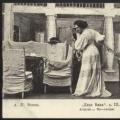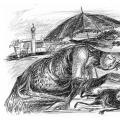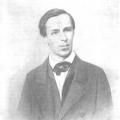When they came martin niemeller. Niemoller Martin - Biography
Friedrich Gustav Emil Martin Niemeller was born on January 14, 1892 in Lipstadt, Germany. He was a famous German pastor who adhered to the religious views of Protestantism. In addition, he actively promoted anti-fascist ideas during the Second World War and advocated for peace during the Cold War.
Beginning of religious activity
Martin Niemeller was trained as a naval officer and commanded a submarine during the First World War. After the war, he commanded a battalion in the Ruhr area. Martin begins to study theology in the period from 1919 to 1923.
At the beginning of his religious activity, he supported the anti-Semitic and anti-communist policies of the nationalists. However, already in 1933, pastor Martin Niemeller opposed the ideas of the nationalists, which is associated with the rise of Hitler to power and his totalitarian policy of homogenization, according to which it was necessary to exclude employees with Jewish roots from all Protestant churches. Because of the imposition of this "Aryan paragraph", Martin, together with his friend Dietrich Bonhoeffer, creates a religious movement that strongly opposed the nationalization of German churches.
Arrest and concentration camp
For his opposition to Nazi control of German religious institutions, Martin Niemeller was arrested on July 1, 1937. Held on March 2, 1938, the tribunal convicted him of anti-state actions and sentenced him to 7 months in prison and a fine of 2,000 German marks.

Since Martin was detained for 8 months, which exceeded the period of his conviction, he was immediately released after the trial. However, as soon as the pastor left the courtroom, he was immediately arrested again by the Gestapo organization, subordinate to Heinrich Himmler. This new arrest was connected, most likely, with the fact that he considered the punishment for Martin too favorable. As a result, Martin Niemeller was imprisoned in Dachau from 1938 to 1945.
Article by Lev Stein
Lev Stein, Martin Niemeller's prison companion who had been released from the Sachsenhausen camp and immigrated to America, wrote an article about his cellmate in 1942. In the article, the author recounts Martin's quotes that followed up on his question about why he initially supported the Nazi party. What did Martin Niemeller say to this question? He replied that he himself often asks himself this question and every time he does it, he regrets his act.

He also talks about Hitler's betrayal. The fact is that Martin had an audience with Hitler in 1932, where the pastor acted as an official representative of the Protestant Church. Hitler swore to him to protect the rights of the church and not to issue anti-church laws. In addition, the people's leader promised not to allow pogroms against Jews in Germany, but only to impose restrictions on the rights of this people, for example, take away seats in the German government, and so on.
The article also says that Martin Niemeller was dissatisfied with the popularization of atheist views in the pre-war period, which supported the parties of the Social Democrats and Communists. That is why Niemeller had high hopes for the promises that Hitler gave him.
Post-World War II activities and credits
After his release in 1945, Martin Niemeller joined the ranks of the peace movement, among whose members he remained until the end of his days. In 1961 he was appointed president of the World Council of Churches. During the Vietnam War, Martin played an important role advocating for its end.
Martin was instrumental in validating the Stuttgart Declaration of Guilt, which was signed by German Protestant leaders. This declaration acknowledges that the church did not do everything possible to eliminate the threat of Nazism even in the initial stages of its formation.

The Cold War between the USSR and the USA in the second half of the 20th century kept the whole world in suspense and fear. At this time, Martin Niemeller distinguished himself by his activity for maintaining peace in Europe.
After the Japanese nuclear attack in 1945, Martin called US President Harry Truman "the world's worst assassin since Hitler." Strong indignation in the United States was also caused by Martin's meeting with North Vietnamese President Ho Chi Minh in the city of Hanoi at the height of the war in that country.
In 1982, when the religious leader turned 90, he said that he began his political career as a hardline conservative and was now an active revolutionary, and then added that if he lived to be 100 years old, he might become an anarchist.
Disputes about the famous poem
Beginning in the 1980s, Martin Niemeller became well known as the author of the poem When the Nazis Came for the Communists. The poem tells about the consequences of a tyranny that no one opposed at the time of its formation. A feature of this poem is that many of its exact words and phrases are disputed, since it was mostly written down from Martin's speech. Its author himself says that there is no question of any poem, it is just a sermon that was delivered during Holy Week in 1946 in the city of Kaiserslautern.

It is believed that the idea of writing his poem came to Martin after he visited the Dachau concentration camp after the war. The poem was first published in print in 1955. Note that the German poet Bertolt Brecht, and not Martin Niemeller, is often mistakenly called the author of this poem.
"When they came..."
We give below the most accurate translation from the German language of the poem "When the Nazis Came for the Communists."
When the Nazis came to take the communists away, I was silent because I was not a communist.
When the Social Democrats were imprisoned, I was silent, because I was not a Social Democrat.
When they came and started looking for trade union activists, I did not protest because I was not a trade union activist.
When they came to take the Jews away, I didn't protest because I wasn't Jewish.
When they came for me, there was no one left to protest.
The words of the poem clearly reflect the mood that reigned in the minds of many people during the formation of the fascist regime in Germany.
(Niemoeller), Protestant theologian, pastor of the Protestant Evangelical Church, one of the most famous opponents of Nazism in Germany. Born January 14, 1892 in Lipstadt, Westphalia. During the 1st World War, the submarine commander (Navy Lieutenant), was awarded the Medal of Merit. After the war, he studied theology, and in 1924 he was ordained to the priesthood. In 1931-37 he was the pastor of a wealthy Berlin church in Dahlem. A staunch nationalist and ardent anti-communist, Niemeller, like many Protestant pastors, initially welcomed Hitler's rise to power and joined the Nazi Party. But his disillusionment with Nazism came when Hitler began to assert the primacy of the state over the church. Niemeller, who headed the Confessional Church, opposed Nazi interference in the affairs of the church and founded, with the support of many pastors in Germany, the so-called. Pfarrenbund (see Pastoral Union).
On June 27, 1937, in Berlin, with a huge gathering of parishioners, Niemeller's last sermon in the Third Reich took place: "We can no longer keep silence commanded by man when the Lord tells us to speak. We must obey the Lord, not man!". Hitler was furious when he was informed of Niemoller's sermon. For many years he hated the pastor, perceiving his sermons as political agitation, while believers, both Catholics and Protestants, considered Niemeller a national hero. On July 1, 1937, Niemeller was arrested and imprisoned in the Moabit prison in Berlin.
To deal with Niemeller, Hitler decided to use the ordinary legal system instead of the Gestapo. The trial (the so-called Sondergericht - an emergency court in charge of crimes against the state) began after repeated delays on March 3, 1938. Accusing Niemeller of "hidden attacks" on the state, the court sentenced him to 7 months of a fortress (a privileged prison for officials) and a fine of 2,000 marks for "abuse of preaching and gathering parishioners in the church."
Enraged by the lenientness of the sentence, Hitler declared that Niemeller "should sit until he turns blue" and threatened the entire court with punishment. After serving 8 months, that is, a month more than the term, Niemeller was released to be arrested again, this time by the Gestapo, "as a preventive measure." Until the end of World War II, Niemeller was kept in concentration camps, first in Sachsenhausen and then in Dachau, where he was with the former Austrian chancellor Schuschnigg, bankers Thyssen and Schacht, as well as members of the royal houses Philip of Hesse and Friedrich of Prussia. In 1945, Niemeller was liberated by the Allied forces.
Speaking in 1946 in Geneva, Niemeller pleaded guilty to Germany for war crimes. In 1947-64 he was bishop of the reformed evangelical church of Hesse-Nassau, consistently campaigning for peace and nuclear disarmament. In 1952 he visited Moscow, and in 1967 Sev. Vietnam.
NIEMELLER, MARTIN
(Niemoeller), Protestant theologian, pastor of the Protestant Evangelical Church, one of the most famous opponents of Nazism in Germany. Born January 14, 1892 in Lipstadt, Westphalia. During the 1st World War, the submarine commander (Navy Lieutenant), was awarded the Medal of Merit. After the war, he studied theology, and in 1924 he was ordained to the priesthood. In 1931-37 he was the pastor of a wealthy Berlin church in Dahlem. A staunch nationalist and ardent anti-communist, Niemeller, like many Protestant pastors, initially welcomed Hitler's rise to power and joined the Nazi Party. But his disillusionment with Nazism came when Hitler began to assert the primacy of the state over the church. Niemeller, who headed the Confessional Church, opposed Nazi interference in the affairs of the church and founded, with the support of many pastors in Germany, the so-called. Pfarrenbund (see Pastoral Union).
On June 27, 1937, in Berlin, with a huge gathering of parishioners, Niemeller's last sermon in the Third Reich took place: "We can no longer keep silence commanded by man when the Lord tells us to speak. We must obey the Lord, not man!". Hitler was furious when he was informed of Niemoller's sermon. For many years he hated the pastor, perceiving his sermons as political agitation, while believers, both Catholics and Protestants, considered Niemeller a national hero. On July 1, 1937, Niemeller was arrested and imprisoned in the Moabit prison in Berlin. To deal with Niemeller, Hitler decided to use the ordinary legal system instead of the Gestapo. The trial (the so-called Sondergericht - an emergency court in charge of crimes against the state) began after repeated delays on March 3, 1938. Accusing Niemeller of "hidden attacks" on the state, the court sentenced him to 7 months of a fortress (a privileged prison for officials) and a fine of 2,000 marks for "abuse of preaching and gathering parishioners in the church." Enraged by the lenientness of the sentence, Hitler declared that Niemeller "should sit until he turns blue" and threatened the entire court with punishment. After serving 8 months, that is, a month more than the term, Niemeller was released to be arrested again, this time by the Gestapo, "as a preventive measure." Until the end of World War II, Niemeller was kept in concentration camps, first in Sachsenhausen and then in Dachau, where he was with the former Austrian chancellor Schuschnigg, bankers Thyssen and Schacht, as well as members of the royal houses Philip of Hesse and Friedrich of Prussia. In 1945, Niemeller was liberated by the Allied forces. Speaking in 1946 in Geneva, Niemeller pleaded guilty to Germany for war crimes. In 1947-64 he was bishop of the reformed evangelical church of Hesse-Nassau, consistently campaigning for peace and nuclear disarmament. In 1952 he visited Moscow, and in 1967 Sev. Vietnam.
Encyclopedia of the Third Reich. 2012
 Uncle Vanya the plot of the play. "Uncle Ivan. Attitude towards the professor of others
Uncle Vanya the plot of the play. "Uncle Ivan. Attitude towards the professor of others Little Tsakhes, nicknamed Zinnober
Little Tsakhes, nicknamed Zinnober Maikov, Apollon Nikolaevich - short biography
Maikov, Apollon Nikolaevich - short biography